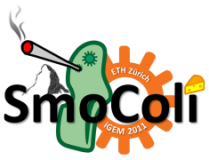Team:ETH Zurich/Achievements/Model Results
From 2011.igem.org
(Difference between revisions)
| Line 9: | Line 9: | ||
|} | |} | ||
|- | |- | ||
| - | |colspan="2"| By modeling and simulating our system we verified its feasibility | + | |colspan="2"| By modeling and simulating our system we verified its feasibility and we decided on the channel design. |
|} | |} | ||
Revision as of 00:19, 22 September 2011
| Modeling Results |
| ||
| By modeling and simulating our system we verified its feasibility and we decided on the channel design. | |||
Feasibility AnalysisWe verified that our initial idea works and that we can actually get a moving GFP band in the channel. In order our smoColi bacteria to start reporting acetaldehyde in the air (when GFP band appears at the begining of the channel), system should be supplied with around 44.05 mg/L acetaldehyde. In order for the band to be able to form at the very end of the channel, the input acetaldehyde concentration should be 2420 mg/L. Above this concentration the alarm is turned on and the channel goes red. |
Process Design
|
 "
"

